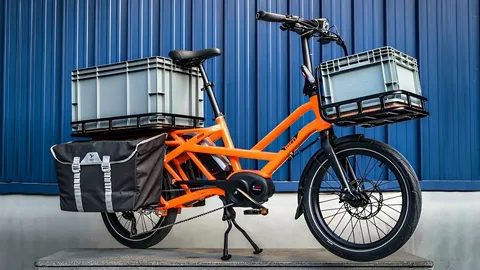With increasing urban populations and growth in demand for fast, efficient, and clean options compared with traditional delivery services, cargo ebikes have evolved to be a robust substitute for conventional delivery vehicles in the last mile. In the logistics system, the “last mile” is usually associated with the final stretch in delivery travel where goods are moved from the distribution hubs to their last destination, usually within cities. While large trucks and vans have dominated this section for years, cargo ebike is increasingly being cast as a more economical, environmentally friendly option. In this article, we look at the economics of cargo ebikes and conduct a cost-benefit analysis for applying these to last-mile delivery services.
Cargo EBikes on the Rise
Cargo ebikes-electric engineered to carry heavy loads, fitted with strong electric motors that assist riders in pedaling, especially when carrying considerable cargo. These bikes are available with long-tail, front-loading, or box-style designs, and a few models offer the versatility of carrying either goods or passengers. The fast growth can be realized with examples such as the Snapcycle Infinity cargo ebike, which has some futuristic design features to meet modern-day delivery services.
They offer a very real benefit over more traditional delivery vehicles, particularly within highly congested urban environments where not only traffic congestion but a general lack of options for parking and environmental regulations often make a traditional delivery so much less effective. By utilizing cargo electric bikes, business owners will be able to avoid fines for expensive parking, speed up deliveries, and reduce their environmental footprint.
Upfront Costs and Operational Expenses
First, the investment in cargo ebikes, such as the Infinity cargo ebike, always tends to be higher compared to ordinary bikes or even smaller electric scooters. Depending on the model, size, and overall features, good cargo ebikes range in price from $3,000 to a maximum of $8,000. For instance, the Snapcycle Infinity cargo ebike has advanced features that include an extended range, more carrying capacity, and smart connectivity, hence increasing its price.
This upfront cost, however, needs to be weighed against operation savings over some time. Besides, in contrast with traditional delivery vehicles that run on fuel, need regular maintenance, and require insurance, electric cargo bikes have relatively low running costs. For instance, the charging cost for an electric cargo bike is minimal just cents a day compared to the fuel costs for delivery vans. Besides that, cargo ebikes are generally cheaper to maintain since they have fewer moving parts compared to a combustion engine, and do not need oil changes or other costly vehicle repairs.
Efficiency and Delivery Speed
Probably the greatest advantage of electric cargo bikes used for last-mile delivery in cities and towns is the efficiency they offer. The issues faced by traditional vehicles include congested traffic, parking, and bottlenecks in delivery. cargo ebikes are better at navigating narrow streets, and finding places to park, thus reducing delivery time practically by half. Greater speeds mean that a firm can complete more deliveries in less time, and this efficiency can affect its bottom line.
The Infinity cargo ebike, with its extended battery capacity and ergonomic design, allows riders to go further without a loss in performance. This extended range added to increased payload capacity makes it a very viable choice for delivery services operating at high volumes of merchandise in the closely built-up urban area. Compared to electric cargo bikes with fewer capacity batteries and reduced load-carrying space, the Snapcycle Infinity offers the best combination of efficiency and load-carrying ability.
Environmental Benefits and Regulatory Compliance
Besides these economic advantages, making use of an electric cargo bike has numerous very important environmental benefits. With the world’s cities tightening their environmental regulations, establishing low-emission zones, and even urban pollution controls, companies must find alternatives to the traditional ways of making deliveries or face regulatory violations. The engines of cargo ebikes run on electricity, and that drastically reduces their carbon footprint compared with gas-powered delivery vehicles. In many cases, businesses using cargo bikes can also benefit from government incentives and tax breaks designed to promote sustainable transportation.
The advantages of delivery services switching over to electric cargo bikes include cost reductions in operational aspects and added value to the corporate social responsibility profile. Consumers are increasingly favoring businesses that demonstrate a commitment to sustainability, and companies that adopt greener alternatives like the Infinity cargo E-bike can position themselves as forward-thinking and environmentally responsible.
Long-Term Financial Considerations
Although the initial cost of a cargo ebike may be a bit higher compared to conventional bikes, in the long term, savings will be considerable. A few reports from the industry do mention that last-mile delivery firms moving to electric cargo bikes could expect around a two to three-year payback because of combined savings in fuels, maintenance costs, increased efficiency, and perhaps higher delivery volumes. Electric cargo bikes are generally cheaper to operate and, due to their ease with urban environments, tend to be cheaper overall to own than conventional vehicles.
Coupled with this, companies can reduce the number of delivery vans/trucks on the road, thereby freeing up much-needed capital for alternative investments or boosting profitability. Moreover, the adoption of electric cargo bikes increases in line with improvements in its infrastructures-charging stations and special maintenance services enhancing its financial viability.
Conclusion
The economics around cargo ebikes are increasingly favorable for last-mile delivery services. With the overall operational cost being lower, better delivery efficiency, and environmental benefits, there is a very strong case to strike companies considering investment in electric cargo bikes. Models like the Snapcycle Infinity cargo ebike become practical and cost-effective solutions to modern logistics issues in urban areas; other than that, regulatory compliance with sustainability applies.
Admittedly, the initial capital outlay might seem a bit high, but it is well worth the long-term savings and efficiency of operations. Companies that adopt cargo ebikes in their operations will greatly reduce their carbon footprint. With the increasing demand for last-mile delivery, the importance of cargo ebikes would be further increased within the logistics ecosystem and would offer a win-win situation both for businesses and the environment.



